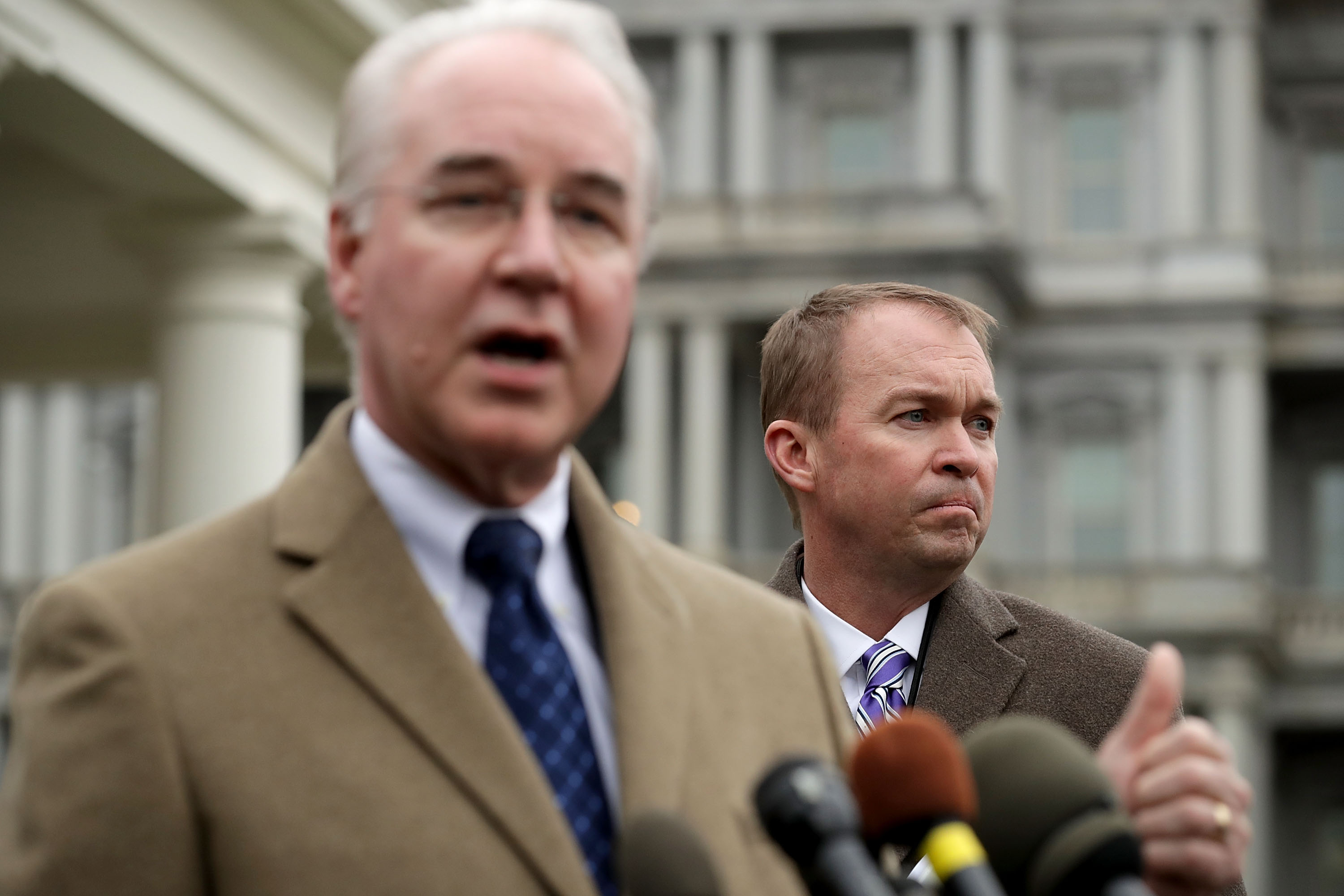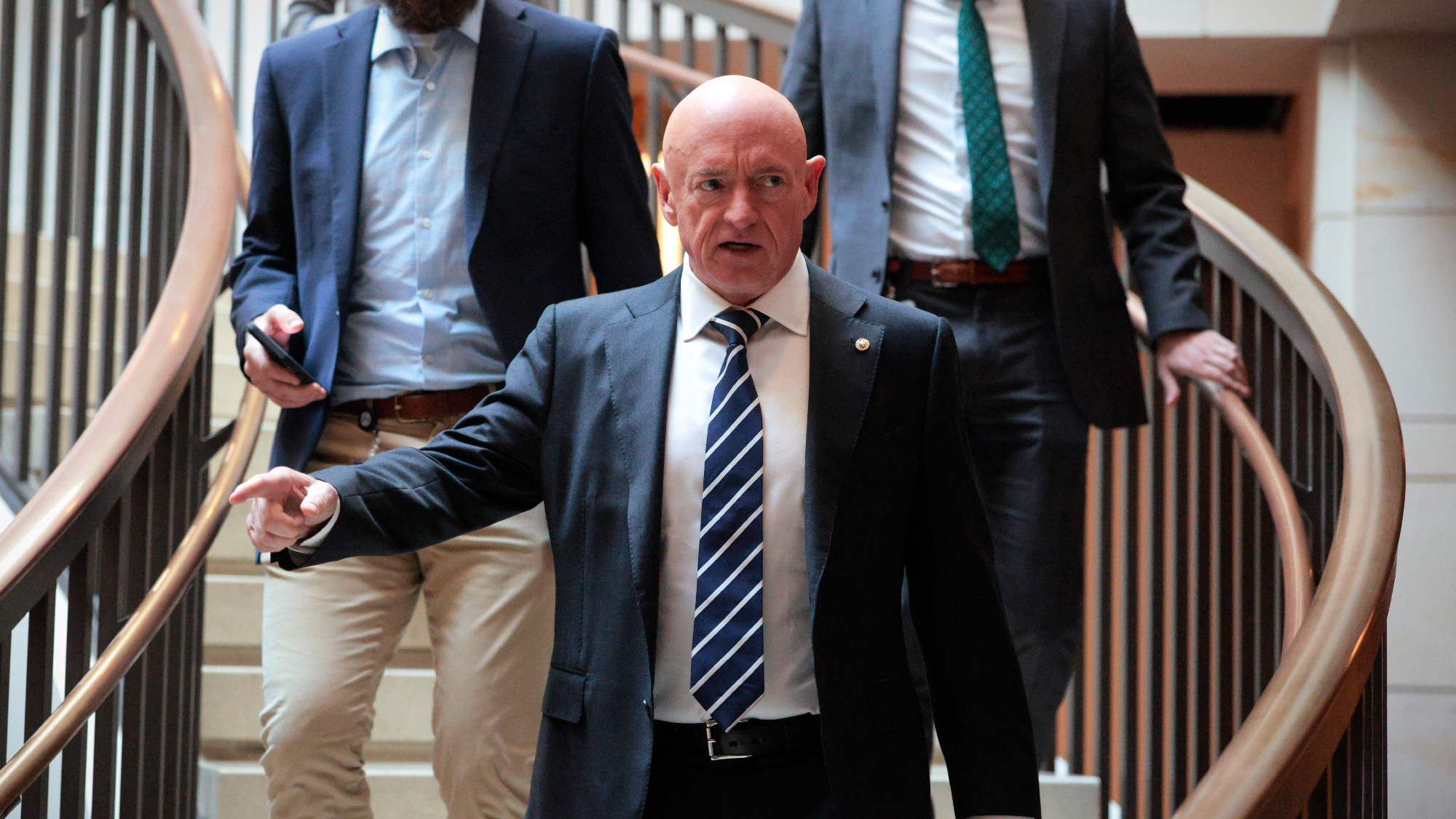The GOP's rank opportunism on the CBO
Before the Congressional Budget Office scored their ObamaCare replacement plan, Republicans have often been happy to treat its projections as gospel


The Congressional Budget Office finally dropped its score of the Republicans' ObamaCare replacement on Monday — and it's an eye-opener. Tasked with projecting the economic and budgetary impact of the proposed legislation, the non-partisan government agency found that 14 million Americans would lose their health insurance next year alone. By 2026, that number would rise to 24 million.
Oof.
President Trump and the GOP were probably expecting something like this. This past weekend, they sent White House budget director Mick Mulvaney out to do a pre-emptive strike against the bad news.
The Week
Escape your echo chamber. Get the facts behind the news, plus analysis from multiple perspectives.

Sign up for The Week's Free Newsletters
From our morning news briefing to a weekly Good News Newsletter, get the best of The Week delivered directly to your inbox.
From our morning news briefing to a weekly Good News Newsletter, get the best of The Week delivered directly to your inbox.
"If the CBO was right about ObamaCare to begin with, there'd be eight million more people on ObamaCare today than there actually are," Mulvaney told host George Stephanopoulos on ABC's This Week. "I love the folks at the CBO. They work really hard. But sometimes we ask them to do stuff they're not capable of doing. And estimating the impact of a bill of this size probably isn't the best use of their time."
Mulvaney wasn't the only Trump administration official sounding this note, either. "If you're looking at the CBO for accuracy, you're looking in the wrong place," White House Press Secretary Sean Spicer recently said. "In the past, the CBO score has really been meaningless," White House chief economic adviser Gary Cohn added this week.
Clearly, the White House is rattled by CBO's score. And being shaken, it has chosen to push back with an argument that's technically true and yet wildly opportunistic and hypocritical.
For people who write about economics, the claim that the CBO's projections just can't be trusted is seriously discombobulating. The CBO is the closest thing America has to an objective referee. It's designed to be a nonpartisan agency, and since its creation in 1975 it's done a good job building credibility with both sides of the aisle. Without trust in CBO's scores as common ground, the left-right debate over economic policymaking would devolve into a raw contest of power.
A free daily email with the biggest news stories of the day – and the best features from TheWeek.com
All of which is more or less true. But what's also true is the CBO isn't a very good referee.
As Mulvaney said, the agency's 2010 projections of how many people would buy insurance on ObamaCare's exchanges overshot by 9.5 million. And that wasn't a small miss.
The CBO has also had a devil of a time projecting the future path of interest rates: Year after year, it's vastly overestimated how fast and how high they would rise.
Then there's the question of federal government debt: Back in 2010, the CBO projected it would be 185 percent of GDP in 2035. Five years later, the CBO was protecting it would take until 2040 to just hit 175 percent.
What's especially significant about the debt example is the federal government didn't radically change its spending and taxation policies in those five years. (Indeed, the 185-percent and 175-percent projections were part of a CBO scenario that assumed Congress wouldn't stick with its own spending reductions.) Instead the debt projections fell because interest rates stayed lower longer than anticipated, and because the rate of health care price growth slowed down. A lot of federal government entitlement spending is buying health care for old people and poor people, so those prices matter a lot for budget projections. But the CBO's formula for modeling the future course of health prices is extremely crude, and it took a few years for the price slowdown to filter through the calculations.
And all that changed in just five years! Imagine how much would change by the time 2035 or 2040 actually rolled around.
Now, it really needs to be emphasized that the CBO's problem isn't a lack of integrity or effort. It's an incredibly sober agency that's very transparent about its logic and assumptions. This stuff is just hard. Interest rates and health care prices are driven by incredibly big and complex economic ecologies whose future is very hard to predict five or 10 years ahead, never mind three decades. As Mulvaney said, "sometimes we ask [CBO] to do stuff they're not capable of doing." The best defense of the agency is that no else is capable of it either, and the CBO does it better than most.
This is where the Republicans' opportunism and hypocrisy comes in: They've been happy to treat CBO projections as gospel when it suits their purposes.
It's where they get the hard numbers that justify their deficit hawkery, after all. Back in 2011, for example, House Speaker Paul Ryan relentlessly wailed that President Obama's policies were setting us on a course for crisis — and Ryan based it all on CBO's numbers. Before he became President Trump's director of the OMB, Mick Mulvaney's biggest claim to fame was insisting the U.S. government's spending and deficits had to be reduced. He was so committed to this goal he was willing to simply refuse any increase in the debt ceiling — and thus risk precipitating a global financial crisis. But the whole argument that federal spending and borrowing is unsustainable rests on the CBO's projections.
Ultimately, what to make of the CBO's work is a judgment call. There's good reason for U.S. politics to treat it with far more skepticism than it does. But there's also a fair argument for trusting the CBO as the best neutral arbiter we have.
But whichever argument you pick, apply it consistently: If one health-care reform bill is too big and complex for CBO to reliably model, as Mulvaney says, how could they possibly do better with something as huge as the entire $3.5 trillion federal budget? Not to mention its interactions with America's $18 trillion economy?
The Republicans can keep insisting there's a looming debt crisis. Or they can wave off warnings that the AHCA will devastate Americans' health coverage. They just can't do both.
Jeff Spross was the economics and business correspondent at TheWeek.com. He was previously a reporter at ThinkProgress.
-
 ‘If regulators nix the rail merger, supply chain inefficiency will persist’
‘If regulators nix the rail merger, supply chain inefficiency will persist’Instant Opinion Opinion, comment and editorials of the day
-
 Trump HHS slashes advised child vaccinations
Trump HHS slashes advised child vaccinationsSpeed Read In a widely condemned move, the CDC will now recommend that children get vaccinated against 11 communicable diseases, not 17
-
 Hegseth moves to demote Sen. Kelly over video
Hegseth moves to demote Sen. Kelly over videospeed read Retired Navy fighter pilot Mark Kelly appeared in a video reminding military service members that they can ‘refuse illegal orders’
-
 Bari Weiss’ ‘60 Minutes’ scandal is about more than one report
Bari Weiss’ ‘60 Minutes’ scandal is about more than one reportIN THE SPOTLIGHT By blocking an approved segment on a controversial prison holding US deportees in El Salvador, the editor-in-chief of CBS News has become the main story
-
 Has Zohran Mamdani shown the Democrats how to win again?
Has Zohran Mamdani shown the Democrats how to win again?Today’s Big Question New York City mayoral election touted as victory for left-wing populists but moderate centrist wins elsewhere present more complex path for Democratic Party
-
 Millions turn out for anti-Trump ‘No Kings’ rallies
Millions turn out for anti-Trump ‘No Kings’ ralliesSpeed Read An estimated 7 million people participated, 2 million more than at the first ‘No Kings’ protest in June
-
 Ghislaine Maxwell: angling for a Trump pardon
Ghislaine Maxwell: angling for a Trump pardonTalking Point Convicted sex trafficker's testimony could shed new light on president's links to Jeffrey Epstein
-
 The last words and final moments of 40 presidents
The last words and final moments of 40 presidentsThe Explainer Some are eloquent quotes worthy of the holders of the highest office in the nation, and others... aren't
-
 The JFK files: the truth at last?
The JFK files: the truth at last?In The Spotlight More than 64,000 previously classified documents relating the 1963 assassination of John F. Kennedy have been released by the Trump administration
-
 'Seriously, not literally': how should the world take Donald Trump?
'Seriously, not literally': how should the world take Donald Trump?Today's big question White House rhetoric and reality look likely to become increasingly blurred
-
 Will Trump's 'madman' strategy pay off?
Will Trump's 'madman' strategy pay off?Today's Big Question Incoming US president likes to seem unpredictable but, this time round, world leaders could be wise to his playbook
